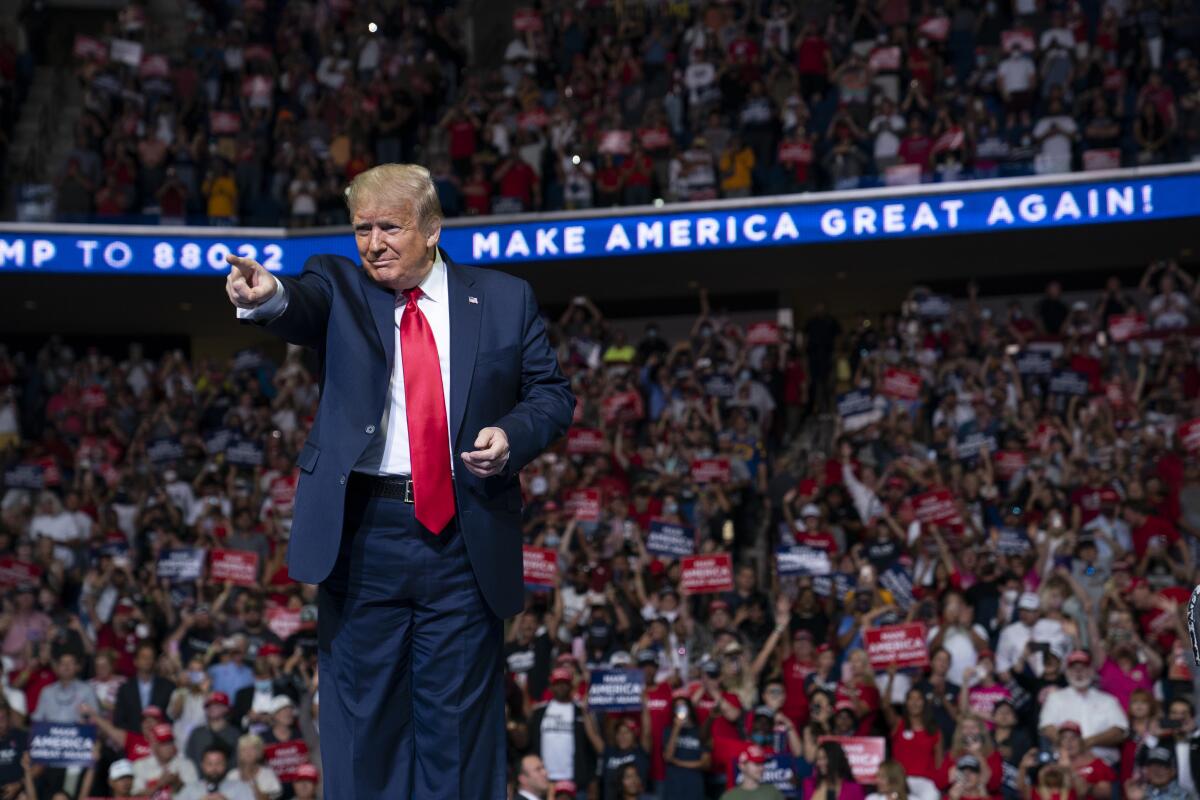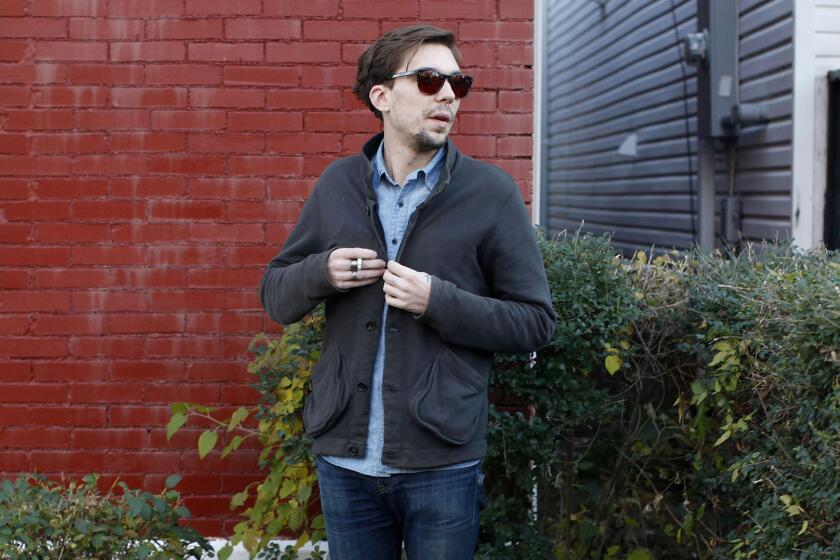Can President Trump play any song he wants at a rally, even if the artist despises him?

- Share via
It’s an issue that comes up every election cycle, and could arise during this week’s Republican National Convention: A musician, usually liberal, cries foul when a politician, usually conservative, selects their song to pump up crowds during appearances and rallies.
The artist or band takes to social media and maybe has their lawyer send a cease-and-desist order. Embarrassed that a popular musician is criticizing the candidate, and eager for the news cycle to pass, the campaign deletes the song from the playlist and the world moves on.
For the record:
2:42 p.m. Aug. 24, 2020An earlier version of this article wrongly attributed a quote made by attorney Alex Weingarten to attorney Lincoln Bandlow.
“You don’t want to play a song at a convention and then five minutes later have a press release by an artist saying, ‘I’m upset. You suck. I can’t stand you,’” explains entertainment lawyer Lincoln Bandlow, who defended the late Sen. John McCain during a suit filed by Jackson Browne for unauthorized use of his 1977 hit “Running on Empty.”
But as is the case in many areas of his presidency, Donald Trump’s determined approach to music selection, most notably his unauthorized use of the Rolling Stones’ “You Can’t Always Get What You Want,” has shattered norms.
The reason? “The concept of shame, or a respect for intellectual property rights or artistic integrity — those concepts don’t apply to this president,” says Alex Weingarten, an entertainment lawyer who represents artists for intellectual property matters and last year counseled Tom Petty’s daughters during a dispute with Petty’s widow, Dana Petty. “Trump doesn’t care.”
Browne’s “Running on Empty,” Bruce Springsteen’s “Born in the U.S.A.,” Neil Young’s “Rockin’ in the Free World,” Tom Petty’s “I Won’t Back Down,” Boston’s “More Than a Feeling” — all have been subjects of disputes between artists and politicians. And though each case is different, many have been quickly resolved due to the presence of what’s known as a blanket license.

A kind of all-you-can-eat buffet for performance rights, a blanket license allows those who buy them to play any song from the catalogs of performing rights organizations such as ASCAP and BMI at public events. A blanket license allowed the Dodger Stadium DJ to play Avenged Sevenfold’s “Hail to the King,” for example, last year each time Walker Buehler approached the plate. It allows the Forum to warm up a pre-concert crowd with Metallica’s “Master of Puppets.”
An artist or rights owner can opt out of allowing its music to be used in blanket license bundles, or specify that their work not be used in political campaigns. But since most musicians dream of national exposure, it’s seldom an issue.
The singer-songwriter’s most recent album was 2019’s “The Saint of Lost Causes.” He had battled addiction for much of his life. No cause of death was given.
Campaigns buy blanket licenses too — ASCAP and BMI licenses only cost a few hundred dollars annually — which is what has allowed the Trump campaign the right to play at public events Rihanna’s “Don’t Stop the Music,” Adele’s “Rolling in the Deep” and R.E.M.’s “It’s the End of the World as We Know It (And I Feel Fine)” despite the artists publicly rebuking the president for doing so.
After the Trump campaign played the R.E.M. song at a rally in January, the band’s Mike Mills issued a statement via Twitter: “We are aware that the President @realDonaldTrump continues to use our music at his rallies. We are exploring all legal avenues to prevent this, but if that’s not possible please know that we do not condone the use of our music by this fraud and con man.”
Despite the license to do so, most campaign operatives in the lead-in to most presidential campaigns have carefully considered the warm-up music, says Will Ritter, CEO of Poolhouse, an advertising agency based in Richmond, Va. He consulted on Mitt Romney’s failed 2012 presidential bid.
During that campaign, “We were doing three rallies a day. Attendees were standing around for almost two hours before they heard a single word,” says Ritter, who has also consulted on campaigns for candidates including Florida Sen. Marco Rubio and Sen. Joni Ernst of Iowa. “You’ve got to fill that void with some music.”
For the Romney run, Ritter’s team made a 60-song playlist that ran on a loop. Before finalizing it, operatives vetted each song, Ritter says, “to see if any of those artists hated Mitt Romney’s guts and would cause a PR problem for us, or if the lyrics were questionable.”
He adds that, historically, when it comes to selection, “the Democrats have a very big advantage over Republicans in the sense that a lot of these musicians support Democrats. You saw it at the DNC — any famous entertainer or musician will come and play for a Democratic politician, most of the time for nothing.”
Ritter went as far as arranging a sit-down between Romney and rapper Kid Rock to ensure that the artist wouldn’t publicly beef with the candidate for using his single “Born Free” as walk-on music. If the campaign did receive such a cease-and-desist from an artist, “an alarm went off, and the world was exploding.”
Trump doesn’t care. Despite the Rolling Stones lodging numerous complaints regarding “You Can’t Always Get What You Want,” he continues to close out his rallies with the song. Ditto the Trump campaign’s use of Neil Young, whose music Trump tapped during his 2016 campaign, to the artist’s dismay. Four years later, Trump used the song again.
Sue him? Go ahead and try, says entertainment lawyer Weingarten. “[Trump] feels very comfortable using litigation as a tool in his ultimate business or political interests.” He’s got lawyers at the ready, Weingarten continues, “and because he doesn’t care about litigating it, and because other people do, he uses that factor to his advantage.”

Ritter says such disregard for shame, threat of litigation and precedent has emboldened Trump’s campaign to play whatever it wants. He cited a conversation he had with one Trump staffer. “He said, ‘Screw it, finally, there’s a candidate who’s not scared of a negative music story.’ So they started playing the Rolling Stones and Beatles — all the awesome music I would have loved to have played but was worried about backlash from the artist.”
In June, Young’s attorneys filed a copyright infringement suit against Trump’s campaign for playing “Rockin’ in the Free World” and “Devil’s Sidewalk” at the president’s June rally in Tulsa, Okla. Alleging unauthorized use, the complaint claims that the president “does not now have, and did not at the time of the Tulsa rally, have a license or [Young’s] permission to play the two songs at any public political event.”
According to a source with a rights organization who spoke on background for fear of political retribution, the Trump campaign has since secured blanket licenses that were absent earlier in the campaign.
Robert Besser, who is representing Young in the suit, declined to discuss the specifics of his client’s complaint but said in an email that taking a stand at this moment in history is essential.
“I do believe that particularly in these highly divisive times it is important that musicians be able to prevent their music from being used by politicians if they so choose,” said Besser. “Otherwise they find themselves in the very uncomfortable position of appearing to support politicians or policies that they oppose.”
A blanket license doesn’t apply to music used in TV, radio or digital ads, which require rights-owners’ permission and a monetary transaction. A Biden PAC couldn’t score a commercial with, say, Childish Gambino’s “This Is America” without first paying licensing fees to songwriters and performers.
Without that license, the law is on the artists’ side. In 2008, for example, when McCain was running for president, the Ohio Republican Party ran an ad criticizing his Democratic opponent Barack Obama. Addressing a comment Obama had made about fighting fuel efficiency, the spot featured Browne’s “Running on Empty.”

Approved by, as Bandlow recalls, “some flunky in the Ohio Republican Party,” the ad aired despite Browne campaigning for Obama at the time. The artist’s legal team filed the obligatory cease-and-desist. Citing the 1st Amendment, McCain’s attorneys argued that the political context constituted fair use.
“We were only asking for an apology,” Browne told an interviewer in 2014. “It became a lawsuit because they refused to say, ‘Oh, right, we shouldn’t have done that.’” Browne prevailed in court and got his apology.
Trump’s not much on contrition, Weingarten says. “That’s the brand, right? ‘I do whatever I want to do, it consequences be damned.’” He adds that if the Trump campaign does want to avoid music issues during this week’s Republican convention, “Diamond and Silk would gladly record something for him to use.”
More to Read
The biggest entertainment stories
Get our big stories about Hollywood, film, television, music, arts, culture and more right in your inbox as soon as they publish.
You may occasionally receive promotional content from the Los Angeles Times.












